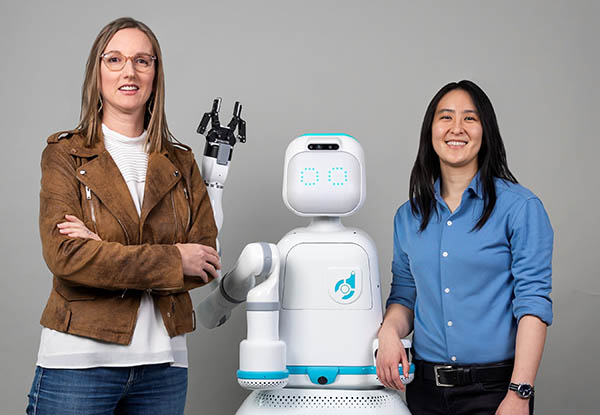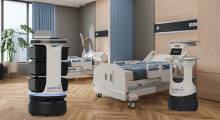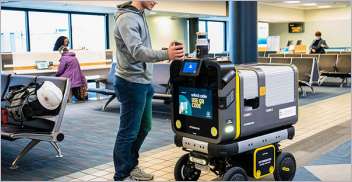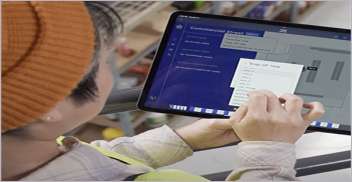Healthcare personnel have been under great stress, but robots can help with some tasks. Diligent Robotics today announced that it has closed over $30 million in Series B funding, bringing the total investment raised to date to nearly $50 million.
“We are proud to have the full support of our past investors and welcome our new partners who joined during our Series B raise,” said Dr. Andrea Thomaz, co-founder of Diligent Robotics.
The company develops service robots and artificial intelligence that enable robots to collaborate within and adapt to human environments. Its flagship product, Moxi, is a mobile manipulator that can perform delivery tasks for frontline healthcare teams.
Automation helps address nursing crisis
Stress and burnout have been a persistent problem in healthcare for years, creating a shortage of nurses and clinical staffers, observed Austin-based Diligent Robotics.
Over the past two years, the COVID-19 pandemic has exacerbated the staffing crisis, with projections of more than 1 million new nurses needed in the U.S. alone, according to Diligent Robotics. More and more health systems are looking for automation to provide workforce augmentation at a critical time for this market, the company said.
“This new round of funding will help us scale the company to meet the incredible demand for our healthcare service robot,” Thomaz said. “Thanks to the support of our investors and the Diligent team, we are focused on expanding automated support for clinical teams so nurses and clinicians can focus on tasks that matter most, patient care.”
Moxi, a nurse’s robot assistant
Founded in 2017, Diligent Robotics claims to be a leader in the social robotics space and the first to build a unique robot with social intelligence and mobile manipulation capabilities to help people in their work environments.
In 2018, the company debuted Moxi, a collaborative robot assistant that assists clinical staff with routine, not-patient-facing tasks including fetching and delivering supplies, medications, or lab samples.
Since launching and integrating into several healthcare systems, Moxi demonstrated improvement in overall clinical flows and gave care team members back valuable time to spend with their patients.
“We started implementing Moxi into our clinical workflows in December and planned on going through a trial phase to determine if the technology would be helpful to our staff,” said Cody Blankenship, vice president performance improvement at Mary Washington Healthcare.
“Right away, we could see the impact Moxi made on the efficiency of our staff and how morale immediately increased,” Blankenship added. “We were so impressed with what Moxi took off our team's hands, we chose to add even more robots to our fleet.”
From protype to commercial product
In the two years since its Series A funding, Diligent Robotics has achieved several milestones. It moved from prototype to commercial deployment.
Between 2018 and 2019, the company partnered with four health systems in Texas to complete a series of research trials. The team incorporated the learnings and demonstrated the commercial value of its technology, incorporating direct feedback from care teams to shape how Moxi fits into clinical workflows today.
The first commercial deployments of Moxi started in 2020. Diligent Robotics said it saw initial success with early customers as nurses quickly adopted Moxi into their workflows.
Diligent Robotics said clinical staffs need to offload a diverse set of tasks that interrupt a nurse's day, including sending and picking up things from the lab, delivering teleboxes, managing the “do not tube” medications, picking up patient's personal items, or transferring pumps or other lightweight equipment from unit to unit.
Demand increasing
Moxi is now fully deployed and integrated into a diverse set of operations across the U.S., from multi-location systems and smaller community hospitals to large academic and research-focused health systems, said Diligent Robotics.
It said demand is skyrocketing, with chief nursing officers from healthcare institutions of all sizes wanting to understand robotics and how Diligent can help alleviate the nursing shortage.
To support this high demand, the company has quickly expanded its team across the entire business from operations, sales, and engineering.
According to Research and Markets, the global smart hospital market is estimated to be at $27.6 billion in 2021 and is expected to reach $82.89 billion by 2026, compounding at 24.6% annually.
“Robotic automation technology will be the key to optimizing efficiency and productivity in health care operations,” said Connie Lee, a partner at Tiger Global. “As a leader in robotic technology, Diligent Robotics has been able to scale to meet demand while developing an impressive product that delivers tremendous value for its customers. We are excited to partner with Diligent Robotics as their positive impact on the healthcare system grows.”
Funds used for faster deployments
Diligent Robotics plans to use its Series B funding to optimize its supply chain and design teams for faster robot deployments.
The teams will “continue to enhance interoperability and drive purposeful integrations with existing hospital infrastructure, electronic health records, and clinical communications, which will allow them to continue to meet the demands during the persistent nursing shortage,” it said.
“Diligent Robotics' participation in the Cedars-Sinai Accelerator program led to the exploration of our team testing this solution with our clinical teams,” said Dr. David Marshall, Chief Nursing Executive at Cedars-Sinai in Los Angeles.
“Using the robot to relieve front-line health care workers from point-to-point delivery and retrieval tasks has been successful in our original launch,” he said. “Staff members have told me that gives them more time for direct patient care.”
Tiger Global, an investment firm focused on private and public companies in the Internet, software, consumer, and financial technology sectors, led the funding round. Existing investors, including True Ventures, DNX Venture, Ubiquity Ventures, E14 Fund, Next Coast Ventures, Boom Capital, and Gainge, also participated. New investors included Cedars-Sinai Health Ventures.
Article topics
Email Sign Up















